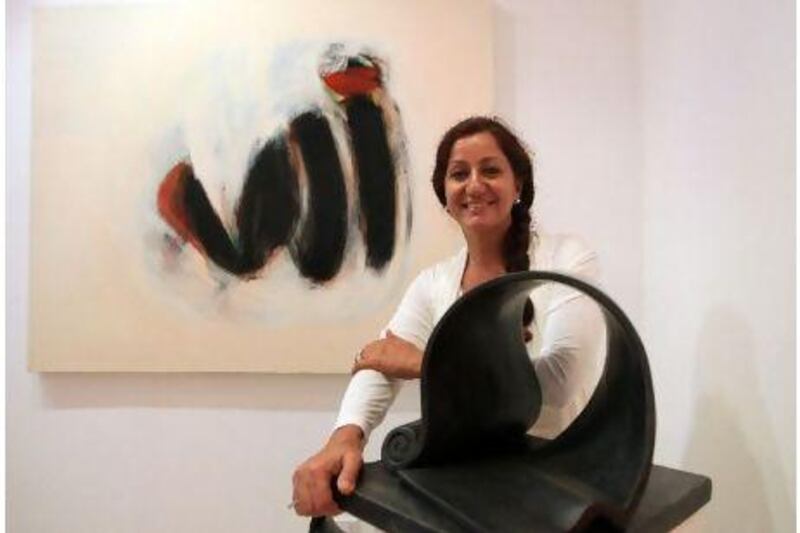ABU DHABI // Salwa Zeidan lets her hands do the talking when it comes to self-expression.
A winner of the 2011 L'Officiel Arab Women of the Year Award in the artist category, Zeidan is not only an artist in her own right, but played an important role in building the Abu Dhabi arts scene.
Between 1988 and 1994, she brought a number of international exhibitions to the emirate. This culminated in her opening the first art gallery in Abu Dhabi, under her name.
"Because there was no art gallery at the time, we had to have these exhibitions in hotels or various other venues," she recalled. "But after the number of exhibitions started increasing, I decided we needed a place dedicated to artists who want to share their work."
Zeidan's art, a mix of abstract and minimalist work in several mediums, is often inspired by her dedication to saving the environment. She recently started experimenting with sculpture as another method of artistic expression. Last year, she won an award at the Abu Dhabi International Sculpting Symposium (Adiss) for her work called The Flower of Adiss, which combined and expanded two recycled sculptures using black granite and a combination of grey and black marble.
"I'm always very worried about what's happening to this world," Zeidan said, stressing the need for environmental awareness. "If we don't do this, if we don't support and inspire change, we'll suffer in the future."
She said the most important characteristic in her artwork is honesty.
"My art depends on how I feel in that particular moment in time," she said. "It's very important that an artist is completely honest about how he or she feels. This is what determines the success of the artwork."
Viewers can immediately sense, subconsciously, whether an artist was being honest at the time he was creating his work, Zeidan said.
"The essence of the artwork is what everyone connects to. The energy travels from within the artwork to the viewer," she said. "This is why some artworks quickly die, and others live on for years."
Zeidan chose to focus on minimalism as the underlying theme of her art because it gives viewers an opportunity to take a break from the daily chaos of life.
"Our world is already bombarded with so many images, whether it's from TV, online, in magazines ..." she said. "Minimalist artwork allows viewers to relax and gives them an opportunity to contribute part of themselves to the piece, and find themselves in it."
In her most recent series, titled The Black Spiral,Zeidan sculpts spiral shapes out of black marble from India and China.
"I chose marble because I wanted a pure element that comes from within the Earth. The marble is so strong, that even when you carve it to be a millimetre thin, it doesn't break," Zeidan said. "And I chose the spiral shape because it symbolises evolution - that good and bad work together to nurture growth."
Her own growth was nurtured in part by a good father, though he died when she was only 12 years old.
"I was very young but he already had made such a huge impact in my life," she said. "He always injected love, poetry and culture in our lives and his guiding light played a huge role in who I am today."
Zeidan continues to carry her father's torch of support when guiding her children, Omar, Ruba, and Racha, who are also aspiring artists.
"I've always given my children the freedom to choose who they want to be, I was never hard on them," she said. "By doing so, they'll become so much stronger as individuals and they'll truly have a passion for what they do. You don't always need to know what decisions to make in life, sometimes in losing yourself you're one step closer to finding out who you truly are."
Inspired, she inspires. Zeidan has consistenly demonstrated an ability to touch the lives of aspiring artists.
Shobha Pia Shamdsani, an interior decorator and art consultant in Abu Dhabi, often recommends Zeidan's work to her clients. Ms Shamdsani said Zeidan's effect on the art world has been invaluable.
"What she's done for young Emirati artists, by guiding and supporting them, cannot be measured," she said. "The job of an art gallery is often underrated - it's not just to sell works. It's to provide aspiring artists with the nurturing and encouragement they need to succeed, and that's exactly what Ms Zeidan does."
Hala Kilani, an avid collector of Zeidan's work, was struck by the artist's use of colour. She was first exposed to Zeidan's art at her gallery in Lebanon.
"It was the first time I felt art was living and that I wanted it to be around me," said Ms Kilani, formerly a journalist with Beirut'sDaily Starnewspaper. "The colours are very intense, but at the same time very simple. Her work is very soothing yet interesting; you see something different each time you look at one of her pieces."
She is not alone in her high opinion. The Iraqi writer and art expert Khaled Motlaq has also praised Zeidan's work.
"You could always know Salwa's work from the colours she used. They were her signature," he said, adding that her inner spirit and passion for what she does are what make her stand out from other artists.
"Salwa doesn't paint for commercial purposes or to sell her work," he said. "She paints because she is Salwa."





